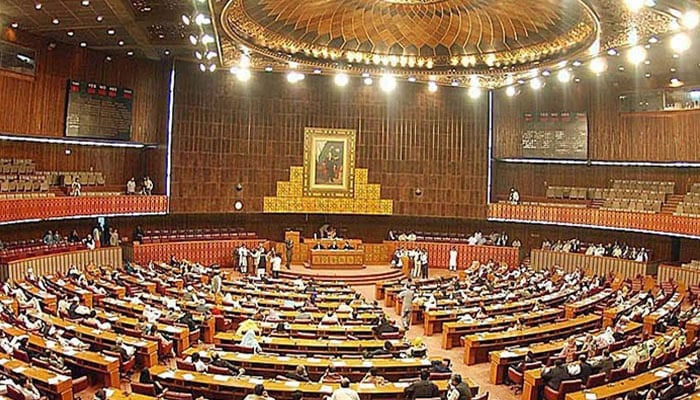Restraint is not weakness
Pahalgam attack, tragic as it was, must not be used as an excuse for warmongering
On Monday, the National Assembly unanimously passed a resolution condemning India’s post-Pahalgam actions. On the same day, Army Chief Gen Asim Munir addressed a gathering at the GHQ and stated that while Pakistan desires regional and global peace, any violation of its sovereignty or territorial integrity would be met with a forceful response. The NA resolution has condemned terrorism and the killing of civilians, while firmly rejecting any attempts to link Pakistan to the Pahalgam attack, and termed the suspension of the Indus Waters Treaty as an act of war – warning that any aggression, including military or ‘water terrorism’, would be met with a swift and decisive response. The fact is that the post-Pahalgam atmosphere of uncertainty refuses to go away. Rather than await the outcome of a proper investigation, the Indian government has opted for its usual strategy of sabre-rattling and blaming Pakistan without evidence, pushing the entire region closer to a flashpoint. India’s aggressive posture is deeply worrying, and Islamabad may move for a UN Security Council meeting at the appropriate time. Pakistan has also welcomed UN Secretary-General Antonio Guterres’s offer to mediate, which should make it clear that Pakistan intends to resolve matters diplomatically. Yet, on the other side of the border, Indian rhetoric has only grown more bellicose, with signs of escalation on multiple fronts.
Pakistan has rightly taken India’s actions regarding the IWT very seriously. A high-level security briefing, attended by federal ministers and senior military leadership, was held on Sunday to update political leaders on the national situation. Unfortunately, the main opposition party (PTI), chose to boycott the briefing – continuing a troubling pattern of avoiding critical security dialogues. The PTI must realise that its absence from this and previous national security briefings, including those on terrorism and regional conflicts, undermines the possibility of building a unified political front in times of national crisis. Opposition parties have a duty to question the government, but that duty cannot be fulfilled from the sidelines. Walking away from the table sends the wrong message – internally and internationally – and further distances the party from the corridors of power. In the realm of national security, unity really ought to trump political rivalry.
Meanwhile, the international community, too, is clearly watching the developments with increasing concern. Iran’s foreign minister’s visit to Islamabad, reportedly aimed at helping to de-escalate tensions, should make it clear enough that even regional neighbours recognise the risks of an open conflict between two nuclear-armed states. The Modi regime’s apparent willingness to use conflict for domestic political mileage is dangerous and irresponsible. Pakistan’s restraint in the face of such open hostility has so far been commendable, but such forbearance must not be taken as weakness. The history of South Asia is littered with near-misses and tragedies that stemmed from political brinkmanship. The Pahalgam attack, tragic as it was, must not be used as an excuse for warmongering. Instead, the international community now needs to step up and ensure that India does not further destabilise the region. In a world already grappling with economic upheaval, climate crises and humanitarian disasters, another conflict in South Asia would be catastrophic.
-
 Caleb McLaughlin Shares His Resume For This Major Role
Caleb McLaughlin Shares His Resume For This Major Role -
 King Charles Carries With ‘dignity’ As Andrew Lets Down
King Charles Carries With ‘dignity’ As Andrew Lets Down -
 Brooklyn Beckham Covers Up More Tattoos Linked To His Family Amid Rift
Brooklyn Beckham Covers Up More Tattoos Linked To His Family Amid Rift -
 Shamed Andrew Agreed To ‘go Quietly’ If King Protects Daughters
Shamed Andrew Agreed To ‘go Quietly’ If King Protects Daughters -
 Candace Cameron Bure Says She’s Supporting Lori Loughlin After Separation From Mossimo Giannulli
Candace Cameron Bure Says She’s Supporting Lori Loughlin After Separation From Mossimo Giannulli -
 Princess Beatrice, Eugenie Are ‘not Innocent’ In Epstein Drama
Princess Beatrice, Eugenie Are ‘not Innocent’ In Epstein Drama -
 Reese Witherspoon Goes 'boss' Mode On 'Legally Blonde' Prequel
Reese Witherspoon Goes 'boss' Mode On 'Legally Blonde' Prequel -
 Chris Hemsworth And Elsa Pataky Open Up About Raising Their Three Children In Australia
Chris Hemsworth And Elsa Pataky Open Up About Raising Their Three Children In Australia -
 Record Set Straight On King Charles’ Reason For Financially Supporting Andrew And Not Harry
Record Set Straight On King Charles’ Reason For Financially Supporting Andrew And Not Harry -
 Michael Douglas Breaks Silence On Jack Nicholson's Constant Teasing
Michael Douglas Breaks Silence On Jack Nicholson's Constant Teasing -
 How Prince Edward Was ‘bullied’ By Brother Andrew Mountbatten Windsor
How Prince Edward Was ‘bullied’ By Brother Andrew Mountbatten Windsor -
 'Kryptonite' Singer Brad Arnold Loses Battle With Cancer
'Kryptonite' Singer Brad Arnold Loses Battle With Cancer -
 Gabourey Sidibe Gets Candid About Balancing Motherhood And Career
Gabourey Sidibe Gets Candid About Balancing Motherhood And Career -
 Katherine Schwarzenegger Shares Sweet Detail From Early Romance Days With Chris Pratt
Katherine Schwarzenegger Shares Sweet Detail From Early Romance Days With Chris Pratt -
 Jennifer Hudson Gets Candid About Kelly Clarkson Calling It Day From Her Show
Jennifer Hudson Gets Candid About Kelly Clarkson Calling It Day From Her Show -
 Princess Diana, Sarah Ferguson Intense Rivalry Laid Bare
Princess Diana, Sarah Ferguson Intense Rivalry Laid Bare




